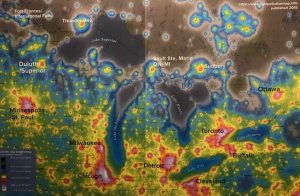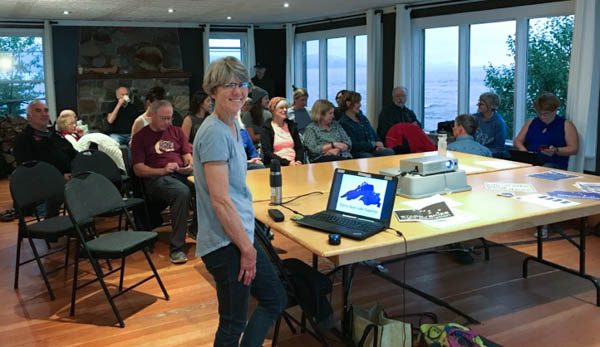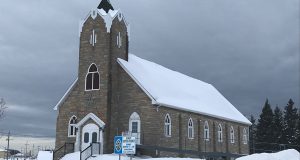Rock Island Lodge hosted a ‘Celebrate the Night Sky’ presentation by Carol Dersch. A full house listened to her presentation about light pollution and the need to preserve dark skies at night.
 Carol Dersch is retired Lake Superior Provincial Park naturalist who was able to explain the four types of night time pollution:
Carol Dersch is retired Lake Superior Provincial Park naturalist who was able to explain the four types of night time pollution:
Urban Sky Glow – this is the glow that you see as you approach Wawa from the highways, often most visible if there is low clouds reflecting the light back to the ground.
Light Trespass – this is light falling where it is not intended, wanted, or needed. Wawa has combated this with the installation of LED lights which not only consume less electricity, but are more focused. They also reduce the urban sky glow.
Glare – excessive brightness which causes visual discomfort. This is often seen at gas stations where the pavillion is so brightly lit.
Clutter – bright, confusing, and excessive groupings of light sources, commonly found in over-lit urban areas. The proliferation of clutter contributes to urban sky glow, trespass, and glare.
Most people believe that a reduction in light at night is merely saving on our expenses, but there is increasing evidence that a bright night sky has effects on our health and insect and animals. From darkskiesawareness.org, “New research suggests that light at night may interfere with normal circadian rhythms—the 24-hour cycle of day and night that humans have used to maintain health and regulate their activities for thousands of years. Light trespass, occurring when streetlights or a neighbor’s security light directs unwanted lighting onto our property or into our homes, contributes to a loss of natural darkness. Wildlife, too, is harmed by the unnecessary brightening of the night. From newly hatched sea turtles to migrating birds, fish, frogs, salamanders, and lightning bugs, artificial night lighting disrupts the cycles of nocturnal creatures in potentially devastating ways. While research is still ongoing, it is becoming apparent that both bright days and dark nights are necessary to maintain healthy hormone production, cell function, and brain activity, as well as normal feeding, mating, and migratory behavior for many species, including humans.”
After the presentation, darkly delicious coffees and delectable chocolate confections were offered by Rock Island’s Judy Moore.
On July 17, 2018, Lake Superior Provincial Park was officially recognized as a nationally certified Dark Sky Preserve by the Royal Astronomical Society of Canada, becoming Canada’s second provincial park to earn this prestigious designation.
- Hwy 17 (Schreiber to Pass Lake)CLOSED – 7:42 - February 5, 2026
- Hwy 11 (Nipigon to Beardmore) CLOSED – 7:24 - February 5, 2026
- Thursday Morning News – February 5th - February 5, 2026
 Wawa-news.com Local and Regional News
Wawa-news.com Local and Regional News

